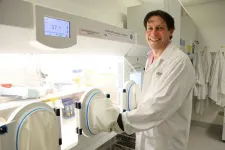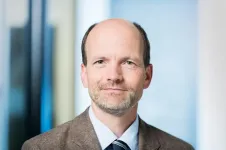Each of these deserving winners will be presenting a plenary lecture at ESE’s annual Congress, the European Congress of Endocrinology (ECE) 2024, which will be held in Stockholm, Sweden from 11-14 May 2024.
The 2024 Geoffrey Harris Award is being presented to Jens C. Brüning (Germany). This Award recognises outstanding researchers in the field of neuroendocrinology. Jens Brüning is the Director of the Max Planck Institute for Metabolism Research and Director at the Policlinic for Endocrinology, Diabetes and Preventive Medicine at the University Hospital (Cologne, Germany) and he provided important studies evaluating the neuronal and neuroendocrine regulation of energy and glucose metabolism. His publication record shows excellent articles including top quoted work in Neuroendocrinology.
His studies unveiled the importance of insulin in the central nervous system (CNS) controlling glucose homeostasis and insulin sensitivity, detailing the regulatory role of hypothalamic neurons and peptides (i.e., Agouti-related peptide). In addition, his group is actively studying the role of genes involved in reward behaviour towards food, with potential important development in the research for obesity treatment. He has received several other scientific awards.
The European Hormone Medal is awarded to an international researcher who has made significant contributions to the field of basic or clinical endocrinology. This year's Award goes to Gudmundur Johannsson (Sweden).
Gudmundur Johannsson is a Professor of Endocrinology and Deputy Director, Institute of Medicine at the Sahlgrenska Academy, University of Gothenburg and a Senior Consultant at the Department of Endocrinology at Sahlgrenska University Hospital, Gothenburg, Sweden.
Professor Johannsson’s clinical, epidemiological and translational research on pituitary and adrenal disorders has advanced our understanding of these diseases and contributed to improved outcome for patients.
His major research interests include pituitary and adrenal diseases, he serves on the Editorial Boards of several international scientific journals, and he has more than 300 publications in peer-reviewed journals.
The European Endocrine Nurse Award is awarded to endocrine nurses and teams who have made a truly significant contribution to the advancement of endocrinology nursing. This year’s Award is presented to Kathrin Zopf (Germany).
Kathrin Zopf works as an Endocrinology Assistant and Study Coordinator at the Clinic for Endocrinology at the Charitè University Hospital in Berlin, where she looks after the study of patients with pituitary and adrenal diseases and is responsible for structured training around adrenal insufficiency.
She has been a nurse since 1993 and completed further training with the German Society of Endocrinology (DGE) to become an Endocrinology Assistant DGE in 2001/2002. Kathrin was a strong advocate for the founding of the Endocrinology Assistants Section of the DGE, promoting networking and cooperation among Endocrinology Assistants, and since 2018 she has chaired the committee. She has been a member of the ESE Nurse Working Group from the beginning, helping strengthen the network of endocrine nurses in Europe and she is also a full member of the ESE Nurse Committee.
The Transatlantic Alliance Award is a joint initiative with the Endocrine Society. It is presented to a recognised international leader who has made significant advancements in endocrinology research, through work and collaboration in both the USA and Europe. The recipient of the 2024 Award is Felix Beuschlein (Germany).
Felix Beuschlein is a Professor of Internal Medicine/Endocrinology and Director of the Clinic for Endocrinology, Diabetology and Clinical Nutrition at the University Clinic Zurich in Switzerland.
His scientific interests mainly relate to adrenal disorders and endocrine tumours. He has authored more than 460 publications in high-ranking international journals and has received a number of awards including the European Journal of Endocrinology Prize and Society for Endocrinology European Medal.
As a strong believer in the value of scientific and clinical networking he has been involved in numerous national and international approaches including coordination of the ENSAT-CANCER consortium and participation in a number of European and international programmes.
Felix is transformational in his research impact and has, through his collaborative approach across European Network for the Study of Adrenal Tumours (ENS@T) and the American Australian Asian Adrenal Alliance (A5), totally transformed the adrenal tumour field and unlocked true Transatlantic collaboration
The Clinical Endocrinology Journal Foundation Award is given for clinical research that addresses aspects of endocrinology at the forefront of clinical practice and is sponsored by the Clinical Endocrinology Journal Foundation. This year's Award goes to Panagiotis Anagnostis (Greece).
Panagiotis G. Anagnostis received his PhD from the Medical School of the Aristotle University of Thessaloniki (AUTH), Greece in 2013 and received an MSc degree from the Open University of Cyprus in 2016.
He currently works as a Consultant in Endocrinology at the Police Medical Department of Thessaloniki, Greece. He is also a post-doctoral researcher and clinical scientific collaborator at the Menopause Clinic of the Unit of Reproductive Endocrinology, 1st Department of Obstetrics and Gynaecology, AUTH. He actively participates as a tutor of many MSc programs in AUTH and National and Kapodistrian University of Athens. He has currently achieved 242 publications in PubMed and has chaired at several national and international congresses.
The Jens Sandahl Christiansen Award is presented to endocrinologists for a specific piece of research or project which contributes to our understanding of metabolism . This award is split in to clinical and basic science. This Award is kindly supported by Novo Nordisk. The recipients of the Award for 2024 are Clémence Blount (France) for Basic Science and Giuseppe Bellastella (Italy) for Clinical Science.
Clémence Blouet is a Programme Leader Track Investigator at the MRC Metabolic Disease Unit, embedded in the Institute of Metabolic Science at the University of Cambridge. She joined the Institute of Metabolic Science after completing a postdoctoral training at the Albert Einstein College of Medicine, during which she received several postdoctoral prizes and published seven first-author papers in leading journals. Her research focusses on oligodendrocyte plasticity in the adult hypothalamic median eminence (ME) and how it is affected by nutritional states, hormones, and glucose homeostasis.
Giuseppe Bellastella is currently Associate Professor of Endocrinology at the unit of Endocrinology and Metabolic Diseases at the University of Campania “Luigi Vanvitelli”. He became an endocrinologist (cum laude) at the Second University of Naples in 2008 and obtained his PhD in Aging and Metabolic diseases in 2011. Giuseppe’s research has a holistic view on links between metabolism, endocrinology and andrology and he has published more than 200 original articles in these areas. Prior to this award, he was also awarded by the Italian society of endocrinology in 2011.
Nominations for the ESE’s 2025 Awards will open later this year (December 2023).
*** ENDS ***
About the European Society of Endocrinology
The European Society of Endocrinology (ESE) provides a platform to develop and share leading research and best knowledge in endocrine science and medicine. By uniting and representing every part of the endocrine community, we are best placed to improve the lives of patients. With over 5,000 individual members and through the 51 National Societies involved with the ESE Council of Affiliated Societies (ECAS) ESE represents a community of over 20,000 European endocrinologists. We inform policy makers on health decisions at the highest level through advocacy efforts across Europe.
To find out more, please visit www.ese-hormones.org.
Follow us on Twitter @ESEndocrinology, Facebook @EuropeanSocietyofEndocrinology and LinkedIn: linkedin.com/company/european-society-of-endocrinology.
END

